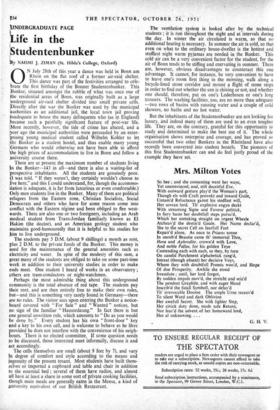iife in the m y iny NAOMI J. ZIMAN (St. Hilda's
College, Oxford) N July 28th of this year a dance was held in Bonn am Rhein on the flat roof of a former air-raid shelter. This dance was part of the festivities arranged to cele- rate the first birthday of the Bonner Studentenbunker. This Bunker, situated amongst the rubble of what was once one of 'the residential areas of Bonn, was originally built as a large kuiderground air-raid shelter divided into small _ private cells. Directly after the war the Bunker was used by the municipal authorities as an additional jail, the local town jail proving • inadequate to house the many delinquents who (as in England) became such a painfully significant feature of post-war life. More recently, however, the tide of crime has abated, and a lyear ago the municipal authorities were persuaded by an enter- prising young medical student called Wilhelm Kohler to let the Bunker as a student hostel, and thus enable many young Germans who would otherwise not have been able to afford the high prices of accommodation to live in Bonn and follow a ,university course there. There are at present the maximum number of students living In the Bunker-143 in all—and there is also a waiting-list of prospective inhabitants. All the students are genuinely poor. (1 was told, " If they weren't, they certainly wouldn't choose to live here," and this I could understand, for, though the accommo- dation is adequate, it is far from luxurious or even comfortable.) Only men students live in the Bunker. Many of them are political refugees from the Eastern zone, Christian Socialists, Social Democrats and others who have for some reason come into conflict with the Eastern regime and been obliged to flee west- wards. There are also one or two foreigners, including an Arab medical student from' Trans-Jordan familiarly known as El Hakim (the doctor), and an American geology student who maintains good-humouredly that it is helpful to his studies for dim to live underground. The students pay 5 D.M. (about 9 shillings) a month as rent, plus 2 D.M. to the private funds of the Bunker. This money is- used for the maintenance of the general amenities such as electricity and water. In spite of the modesty of this sum, a great many of the students are obliged to take on some part-time work in addition to their university studies in order to make ends meet. One student I heard of works in an observatory ; others are tram-conductors or night-watchmen. Perhaps the most admirable thing about this underground community is the total absence of red tape. The students pay their rent, and are then entirely free to make their own rules, but—and this is something very rarely found in Germany—there are no rules. The visitor sees upon entering the Bunker a notice- board covered with " For Sale ' and " Wanted " notices, but no sign of the familiar " Hausorcinung." In fact there is but one general unwritten rule, which amounts to "Do as you would be done by." Every student has his own " front-door " key and a key to his own cell, and is welcome to behave as he likes provided he does not interfere with the convenience of his neigh- bours. There is no elected committee. If some question needs to be discussed, those interested meet informally, discuss it and act accordingly. The cells themselves are small (about 9 feet by 7), and vary In degree of comfort and style according to the means and Ingenuity of the present tenant. Most students haVe built them- selves or imported a cupboard and table and chair in addition to the essential bed ; several of them have radios, and almost all have at least a share in some sort of private cooking facilities, though main meals are generally eaten in the Mensa, a kind of amiversity equivalent of our British Restaurant. The ventilation sysient is looked after by the technical students ; it is fun throughout the night and at intervals during the day. In winter the air circulated is warm, so that no additional heating is necessary. In summer the air is cold, so that even on what to the ordinary house-dweller is the hottest and stuffiest night warm pyjamas are needed in the Bunker. This cold air can be a very convenient factor for the student, for the air of Bonn tends to be stifling and enervating in summer. There are, however, obvious disadvantages to counteract this one advantage. It cannot, for instance, be very convenient to have to leave one's room first thing in the morning, walk along a bicycle-lined stone corridor and mount a flight of stone steps in order to find out whether the sun is shining or not, and whether one should, therefore, put on one's Lederhosen or one's long trousers. The washing facilities, too, are no more than adequate —two rows of basins with running water and a couple of cold showers, no baths and no hot water. But the inhabitants of the Studentenbunker are not looking for an even tougher life. and indeed many of them are used to aher life. They are, on the contrary, grateful for this opportunity to study and determined to make the best use of it. The whole organisation shows enterprise and courage, and has proved so successful that two other Bunkers in the Rheinland have also ce rently been converted into student hostels. The pioneers of this first Studentenbunker, can and do feel justly proud of the example they have set.


































 Previous page
Previous page